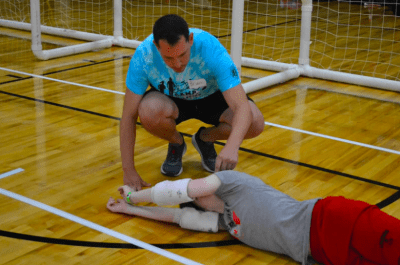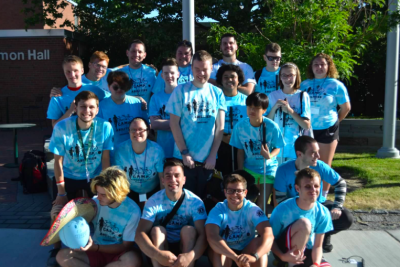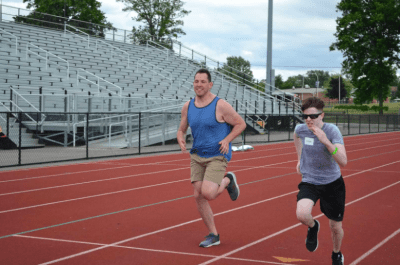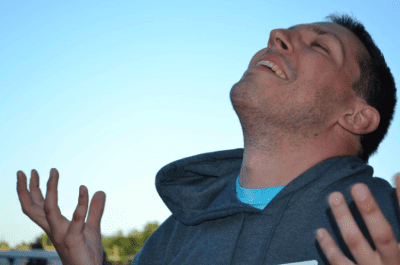By June Converse.
The Five Qualities of a Coach
One of the most unique – and I think the best – elements of Camp Abilities is the one-on-one coach-to-athlete relationship. Every athlete is paired with a coach, and it is that coach who inspires and challenges, believes and encourages, prepares and participates.
You’ve likely noticed that, unlike other camp models, at Camp Abilities the campers are called “athletes” instead of “campers”. This is more than semantics. Every volunteer at Camp Abilities – from the director to the one serving the food – believes in the athletic ability of every camper, regardless of visual acuity. But it is the Coach who must believe this first. It is the Coach who convinces his athlete to embrace the truth of their skills and abilities. It is the Coach who must believe the athlete can achieve.
It is the Coach who must believe the athlete can achieve.
What an athlete takes away from camp – both in skill and confidence – is guided by the Coach. I asked Lauren Lieberman, founder of Camp Abilities, to tell me the five most important qualities of a coach. Without a delay, she said,
- Enthusiasm
- Patience
- High-Expectations (of themselves and of the athletes)
- Recognizing Achievement
- Pride (both feeling pride in the achievements and instilling a sense of pride in the athletes)

The Biggest Smile and the Booming Laugh
Brian is tall – well over six feet. He’s got this great booming voice and he laughs – a lot! But what’s most noticeable about Brian is his smile. Not only was it full of joy, but it was also authentic, and it never faded. Even after an entire week of early wake ups, and falling in the canal, and jumping off telephone poles, Brian was still smiling and laughing.
How and why, then, did he become a special education* teacher?
Always interested and curious about peers with disabilities, Brian volunteered for his first camp at the age of 15. Technically he was too young to be a volunteer at an Easterseals respite camp, but that did not stop him. “I wanted to get my permit and I wanted to go to work there.”
“I did it. I did three weeks and then went home for a couple of weeks and went back for two more.”
While I can’t verify it, I believe the Easterseals camp director saw Brian’s smile, heard his laugh, felt his authentic desire to support children with disabilities and made sure he was allowed to work at the camp regardless of his age.
“That’s like, a ‘job’.”
It was during his summer with the Easterseals he realized he could “actually do this for a living. A special education teacher, that’s like, a ‘job’. That sounded perfect, awesome. I immediately started exploring programs.”
When he graduated from high school, he attended Illinois State University, studying special education.
Initially he worked with third, fourth and fifth grade students who had emotional, intellectual and/or learning disabilities. When asked what he found most challenging, it wasn’t the students. It was the “restrictions, [and] mandates for paperwork. I felt like administration and parents were asking me to prove it, prove it, prove it.”
“I was a young teacher and I loved it, but I hadn’t yet figured out how to articulate how much I loved it.”
In classic Brian, he laughed and added, “Oh yeah, I’m good. I know what I’m doing now.”
One of the perks of being a public-school teacher is the summer break. But Brian chose to give up his summer to work with teenagers with multiple disabilities. Eventually he decided to return to school and add low vision and blindness to his certification. The day following this interview, he began his career in the school system as a TVI (teacher for the visually impaired). This time he is working primarily with high school and middle school students.
But was he ready to move from elementary to high school? He watched kids learn to play ball and swim and ride bikes. But what did Brian himself learn as a Coach at Camp Abilities? Where did his confidence grow?

Camp Abilities is More than A Sports Camp
When we think about Camp Abilities, we think about the sports the kids learn, about the goals they set, about the independence they acquire. But Camp Abilities is so much more. Every year, at every camp, a group of young people volunteer to be coaches. When they walk away at the end of the week, they are as changed as the athletes themselves.
Brian had all the textbook knowledge for how to work with students who are visually impaired. But he recognized the need for hands-on experience. He spoke to his professor at Illinois State for recommendations and soon he was in the car making the 10-hour drive from Chicago, IL to Brockport, NY.
As fate would have it, he was assigned to the upper middle/high school group.
“That was not a request. If anything, I was like, ‘Hey, can you move me to the pink [elementary]? Like, what’s going on here?’ I stuck with it and it all worked out. One of my biggest anxieties was having to navigate high school and high school attitudes. Camp Abilities really helped me with that.”
His athlete at camp was a young man named Ronan and Brian was there for Ronan every step of the way and vice versa.
But Brian was also there for so many others. On the sidelines of beep baseball, he looked like a little league coach – racing up and down the baseline, clapping and screaming words of encouragement. He didn’t just know Ronan’s name – he knew every athlete in his group (and most kids in other groups) and every athlete heard Brian shouting his/her name. I believe they could also hear the smile and pride in his voice.
The Next Level
“Camp Abilities takes camp to the next level and says to the athletes, ‘This is how you are going to use this at home. You don’t just come to camp to do sports. Camp Abilities is providing you with the tools to figure out how to get it to happen at school. We teach you how to run track at camp, but we also expect you to figure out how to do it at school.’ The Self-Advocacy component was a huge part of why those kids are there.”
“It was nice to see true accommodations in action.”
You know when Brian’s excited because he sits up taller, and his words tumble out of his mouth as if his passion can’t keep up with his tongue. He was thrilled about so many things he could take back with him.
“All the adaptations. It’s so grand. Sport and adaptations that work. It’s not stuff we are guessing at and willy nilly trying. This is proven…It was nice to see the true accommodations in action. For example, my understanding of visual baseball and soccer is so complex, right? How are we making contact? How are we running around bases? How? Then you see a person who is blind and you’re like, ‘Okay. It’s still difficult but manageable.’ It can be taught with verbal cues. I know it can because I saw it.”
The athletes are encouraged to share their unique visual situation. They discuss diagnosis and acuity. They are not embarrassed or ashamed. To the athletes, their visual situation just is. It’s a part of who they are. But like so many of us, Brian was unsure if and how to talk to a student about his vision.
“I think I’ve gotten over the hurdle of beating around the bush about the visual impairment. Now I feel with visual impairment, it’s pretty crucial to know what they are seeing and teach them how to describe what they are seeing. Being able to have those discussions was a huge takeaway.”

Beyond the Lecture
I asked Brian what he would say to a parent who was reluctant to let their child participate.
“The old me would have been like, ‘Here’s the research. Here’s the data. This is why it’s important to have physical activity.’ But how many people respond to a lecture? Now I can say, ‘Hey, I’ve been to this thing called Camp Abilities. I’ve seen it. I’ve done it.’”
Camp Abilities Never Really Ends
At camp, Ronan ran a 6.49 mile. Brian ran a 7.1 mile. You could watch Ronan move ahead and hear Brian yell, “Run without me!”
Brian, Ronan and Ronan’s mom are often in contact via text. Ronan, after Brockport, attended the Camp Abilities in Saratoga. Ronan won best camper in Saratoga. I can imagine Brian’s smile and laugh.
“I’ll keep telling him my time. He keeps telling me his.” He pauses, cocks his head, and says with that liveliness unique to Brian Kulaga. “I will beat his [time].” Brian shrugs and adds, “Well, we’ll see.”
Next Summer and Beyond
Brian plans to continue volunteering at Camp Abilities and he wants to travel to other camps. “I went to home base [Brockport]. I got to see Camp Abilities as it should be and now, I feel like a VIP. I can go wherever and be like, ‘Oh, I’ve been to Brockport. I know what to do and I can do this.’”
Brian told me, “I’ve been thinking lately about getting involved in early intervention to help encourage parents to develop the mindset of ‘It’s okay for your child to try. It’s okay for your child to fall.’” With this in mind, Brian hopes to pursue his license in Orientation and Mobility this summer.
I look forward to seeing Brian at camp year after year and watching him grow into all that he can be, to see the forever impact he can have in the lives of the visually impaired. And, I want to see him race Ronan! My bet is on Ronan.
If I were to create a poster of the “perfect Coach” – the Coach who embodies all five of Lauren’s qualities of excellence — Brian Kulaga would be on that poster. And you know what, he would be willing, and he would be smiling.
“This is who I am. My job is real, and it is awesome.” ~ Brian Kulaga, summer 2022
While this article profiles one Coach, every coach is dedicated and enthusiastic and Camp Abilities is privileged to have such a wonderful group of young people who want to make a difference.
The Self-Advocacy video not only showcases what the athletes are learning, it showcases the Coaches as well. The video is only seven minutes, and you will be glad you watched it. Look for Brian – he’s the tall guy with the huge smile!
*Many programs have changed the name of their Special Education program to Inclusive Education.


